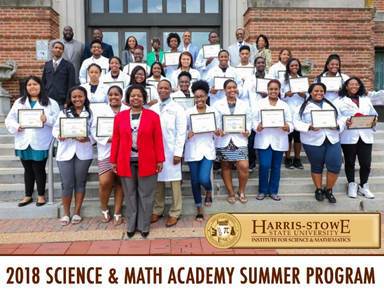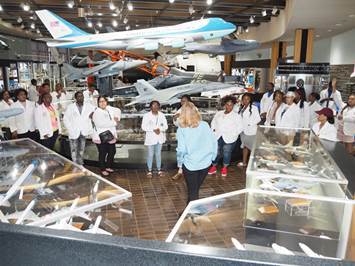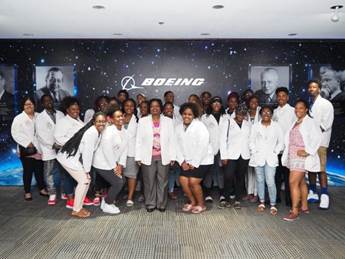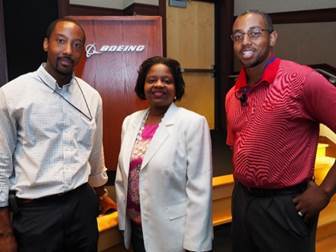By Dr. Tommie Yvette Turner, Director of the Institute for Science and Mathematics at Harris-Stowe State University
Through the support of the National Science Foundation Historically Black Colleges and University Undergraduate Program (HBCU-UP) Implementation grant and before fall semester classes start at Harris-Stowe State University (HSSU) 25 selected STEM freshmen are diligently preparing for their academic and professional careers. These students are participating in a rigorous five week residential pre-college preparatory program called Science and Mathematics Academy at no cost. Also, free tutoring and other academic resources are provided during the summer program so that students will transition from high school to college successfully. Upon completion of the five week program and enrolling at HSSU, each student will receive a $1,000 stipend.
The Science and Mathematics Academy provides incoming freshmen with a sense of community and self-identification as STEM majors. Borrowing from the tradition of the White Coat Ceremony established in 1993 by The Arnold P. Gold Foundation at Columbia University’s College of Physicians and Surgeons, each student begins the summer program by receiving their official Science and Mathematics Academy laboratory jacket and certificate of participation during the opening ceremony.
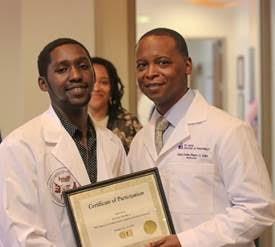
In celebration of the students’ accomplishments, Dr. Isaac Butler, Vice President, Diversity and Inclusion & Adjunct Assistant Professor, Pharmacy at the St. Louis College of Pharmacy served as the opening ceremony keynote speaker. The goals of the Science and Mathematics Academy program are to academically prepare incoming freshmen for introductory STEM courses, proper time management and planning, appropriate study techniques, and note taking skills. In addition, all participating students complete the Educational Testing Services Success Navigator Assessment prior to starting the academy and again at the end of the summer. Based on Success Navigator assessment scores, students receive weekly intervention sessions facilitated by Dr. Alonzo DeCarlo, Assistant Provost and Director of Graduate Professional Studies, to address identified areas of improvements. To establish academic expectations for college, students attend mandatory study hall, complete homework assignments, group projects, midterm exams, and final exams all within five weeks. From 8 a.m. – 5 p.m. Monday through Wednesdays, students are receiving instruction in mathematics, biology, physical science, chemistry, computer education, college preparation, and professional development. The classes are taught by HSSU faculty members David Barnes, Dr. Aarati Juvekar, Dr. Wendell Brooks, Dr. Steven Smith, Deola Dean and Tina Grimes, respectively. Also, each student will write and present a term paper regarding the impact of artificial intelligence (AI) on their respective major field of study ranging from biological sciences to mathematics and engineering. Thursday afternoons are reserved for weekly STEM field experiences so that students can learn more about HSSU’s partnerships with local institutions such as Barnes Jewish College Goldfarb School of Nursing, Washington University in St. Louis Program in Occupational Therapy, Saint Louis Zoo, and Saint Louis University Parks College of Engineering, Aviation and Technology.
In addition, this year the National Society of Black Engineers (NSBE) Aerospace Alumni Chapter with Kevin Mixon, President Emeritus (2013-2017) and current Advisor and Professional Development Chair along with Jeremiah Giles as the Vice President, graciously hosted the academy students at Boeing. The engaging afternoon was spent with HSSU students networking with NSBE members and other collegiate interns, touring the Boeing Makerspace and Prologue Room, and learning about the history of aerospace and The Boeing Company.
As several academy students reflect on their respective summer transition from high school to college, incorporating time management and appropriate study skills are the main topics. These students share their respective journey in the academy and advice to other incoming STEM freshmen. As Mikayla Neal, a biology major states, “The biggest eye-opener for me is how fast-paced college is. It is a stressful environment but you have to get the hang of it. By participating in the 2018 Science and Mathematics Academy summer program it has allowed me to get adjusted to other’s lifestyles and to be more organized with my own. I would tell incoming freshmen who are STEM majors to study hard and work harder than ever before. College is a different ballgame compared to high school. Be ready and make smart decisions.”
Bruce Higgins, a dual degree math/engineering major, states that the biggest eye-opener for him since graduating from high school and entering college is “Being able to manage my time off of a schedule and actually learning how to use a planner that best fits me. The five week residential program has helped me by knowing the difference between high school expectations and college expectations. College is more about you and not having somebody over your shoulder telling you to go to class and did I do my homework. The advice that I will give freshmen STEM majors is to be serious and be ready to work hard and study hard.”
Edgar Williams, a dual degree math/engineering student states, “The biggest eye-opener was the responsibility in managing my own studying time and making sure that I get my assignments turned in on time. The academy five week program is preparing me to be more organized but also allows me to prepare myself mentally for college. The advice that I would give to freshmen about being a STEM major is to set up a schedule and plan out your day.”
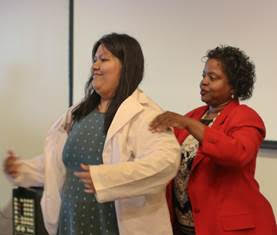
Rose Juarez another biology major comments on the amount of studying and time management that is required in college. Rose states about her transition and what she has learned since high school graduation. “It took a week for me to adjust to college but now I know where most of my classes are. So I got ahead by joining this program and I have enjoyed it so far. Time management for high school times are way different than for college. What I mean by that, you definitely have to put more hours studying for your classes. Also, being at an HBCU, I don’t feel any different since I am Mexican. I really like Harris-Stowe and I am looking forward to this fall. I will tell other freshmen to study, mostly. In high school, I would study but not enough hours like I do now. Also, pay attention in class and take notes even if you don’t understand it right now. Then, go over them later on. Also, create or join a study group. It will truly help.”
The 2018 Science and Mathematics Academy students are ready to matriculate at HSSU, engage in a fruitful collegiate experience on campus and reach their respective goals of graduation, great job scholars.
About Harris-Stowe State University
Celebrating its 160th anniversary, Harris-Stowe State University (HSSU), located in midtown St. Louis offers the most affordable bachelor’s degree in the state of Missouri. The university is a fully accredited four-year institution with more than 50 majors, minors and certificate programs in education, business and arts and sciences. Harris-Stowe’s mission is to provide outstanding educational opportunities for individuals seeking a rich and engaging academic experience. HSSU’s programs are designed to nurture intellectual curiosity and build authentic skills that prepare students for leadership roles in a global society.
